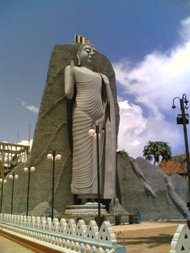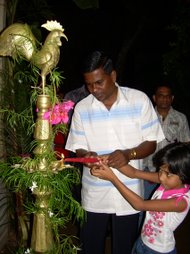Antigone comes alive
July 23, 2010, 5:13 pmhttp://www.island.lk

Reviewed by Gaston Perera
A group of young university people, the Academic Players from the Drama and Theatre and Image Arts Unit of the University of Kelaniya have produced Sophocles’ Antigone in Sinhala under the direction of Priyankara Ratnayake. It was performed at the Lionel Wendt on the 16th and 17th July.
When most other students are either shouting slogans or throwing stones or merely vegetating in the dismal university world, the very fact that these young people should involve themselves in theatre is something so refreshing and so encouraging that by itself it is worthy of the highest commendation. But even more praiseworthy is the fact that they should venture to produce nothing less than Sophocles’ Antigone.
It is a brave person indeed that would dare to produce a Greek play in Sri Lanka, leave alone Antigone. The difficulties seem insurmountable. There is no onstage action in a Greek play, only the spoken word. There is no exposition because the Greek spectators would be familiar with the cycle of legends on which the drama is based. Then there are those strange, unfamiliar conventions to deal with like the Chorus and Messengers. Most of all there always is in the background a whole world of equally strange and unfamiliar "mores", such as, for instance, the significance of an unburied corpse which is the whole point of the play, Antigone.
And yet this play, first produced 2500 years ago in 5th century BCE Athens in its heyday, has enjoyed a popularity that has never faded. In modern times alone it has been produced in France, Germany, Spain, Puerto Rico, Argentina and Peru. It has inspired renowned dramatists such as Bertolt Brecht, Jean Cocteau and Jean Anouilh to write dramas based on its themes. Even operatic versions of Antigone have been composed. Sri Lanka, too, has had the good fortune of witnessing it when it was produced by Somalatha Subasinghe in the 90s.
The secret of the universality of its appeal lies in the timelessness of its themes and their continued relevance to every age and every clime. Antigone’s defiance of the ruler Creon’s edicts symbolizes at one level the eternal conflict between religious obligations and the obligations to the state. Such a theme embodies also a whole range of other resonances such as state control and civil disobedience and human rights and the nature of justice. It also raises other profoundly serious issues such as the proper application of the laws of a state. It throws into focus the tragic consequences that ensue when these laws are insisted on obdurately and without restraint. It is as if Sophocles is saying in this play that when the edicts of political authority and the dictates of religion – each of which are intrinsically justifiable by themselves – come into confrontation and become irreconcilable, a fatal outcome can only be avoided by giving primacy to religion.
Priyankara Ratnayake’s production steers clear of most of these issues. He sees Antigone’s predicament as the consequence of the conflict between the demands of religion and the demands of political authority. This conflict is depicted in his production by Antigone’s fierce determination to give a proper burial to her dead brother, Polyneices, as religion demands and Creon’s equally unyielding resolve to deny that to him as a rebel against the state. It is the excellent acting of the players that enables him to get this across.
Viswajith Gunasekera is well cast in the role of Creon. He has the advantage of stature and build to suggest kingliness and at all times exudes a quiet air of unruffled authority. But his unwavering resolve that the rebel Polyneices must pay for his treason emerges in the rare fury and raised voice when his edict is questioned or in his dogged refusal to reconsider his decision despite even the warnings of the prophet, Teiresias. And when in the end the world crashes around him he plays the broken man also to perfection. Antigone also plays well the role of the sister with a burning commitment to secure a decent burial for her dead brother. Neither Ismene, her sister, nor any one else can dissuade her and in her exchanges with Creon she shows a supercilious indifference to his threats with her contemptuous smile. When she is led away to her death her farewell speech in the original Greek is here rendered as a song of lamentation. This was an exquisite performance by itself and surely the range and power in her singing speaks of a trained voice. Ismene, Haimon, the betrothed of Antigone, and Teiresias, the blind prophet, all played their parts competently and well. But the other outstanding performance came from the sentry. His was a bit part really and intended to provide an element of comic relief but he was eminently successful in portraying the down-to-earth, garrulous guard, not over-awed by royalty or occasion. All in all, therefore, the acting is of a very high standard and it is this aspect of the performance that makes up for other drawbacks.
Priyankara Ratnayake would do well, for instance, to pay more attention to the spoken word, which is after all the conduit for communication with the audience. The programme says the translation of the play into Sinhala was done by Ariyawansa Ranaweera. It is not clear whether the translation is from the original Greek or from another English or other translation and, if so, whose. The need for this is to understand the nature of the script and the words the actors are to speak. Very often it sounded high-flown and not easily intelligible and not the language of everyday speech. But even that is what little was actually heard. This is the other point. Much of what was spoken onstage was inaudible or spoken too fast to be grasped. In fact very little could be gathered of that crucial opening scene between Antigone and Ismene where the resolve to defy Creon is first stated because neither could be heard – and that is from as far forward as the fourth row. Two exceptions to this were Creon and the sentry.
Another issue that requires attention relates to the sets, props and costumes. In the world of the theatre it is these that create the illusion of the time and the place where the dramatic action occurs and produce that virtual reality the dramatist strives to achieve. In Priyankara Ratnayake’s production the sets are basic and minimal and are adjusted by the actors themselves in the course of their movements. They do little to add anything as regards time and place. The same could be said of the stage props which seem to be chairs and tables from a kindergarten. The costumes are indeterminate. Creon comes in a bifurcated garment and tunic while Antigone appears in a white strapless, halter-necked evening gown. The soldiers carry what look like fire-arms and present day army helmets. Such attire does not suggest a 5th century BCE Athens by any means but rather the 21st century Colombo. Perhaps what Priyankara Ratnayake wants to suggest is the present day in keeping with the subtitle he has chosen for his performance - "A Day Like Today". But modern dress will not do in a Greek play – what with its strange conventions like the Chorus and its strange "mores" relating to burial.
In fact where Priyankara Ratnayake’s production falters most is in relation to the Chorus. The role of the Chorus is quintessential to Greek drama. It has been defined as the "ideal spectator". This is because what the Chorus says is what the dramatist wishes the spectators to understand as his views. The Chorus interpretes the action onstage as the dramatist sees it. In the Greek original of Antigone the constant plea of the Chorus is for restraint, for abstaining from excess whether in the exercise of political authority or the expression of private conscience. In Priyankara Ratnayake’s production there is, alas, none of this. The Chorus there is reduced to an unmitigated mockery. Instead of giving expression to the lofty sentiments in the original Greek what the spectators were treated to was a kind of perverted physical jerks and PT drill and at other times a baila dance. The only impression that was conveyed by these meaningless contortions and gyrations was that there was a hopeless misapprehension of the real function of the Chorus and they only succeeded in creating an irritating distraction from the main action.
All this is, however, is not to decry the achievements of these young players but only to make suggestions – sincerely - for improvement in the forthcoming performances. As I said earlier it is something immensely gratifying that there still are university students producing plays instead of throwing stones. Their commitment to theatre and their courage in producing a Greek play deserves commendation. One must, therefore, wish them every success and pray that their dedication should not flag.





















































No comments:
Post a Comment